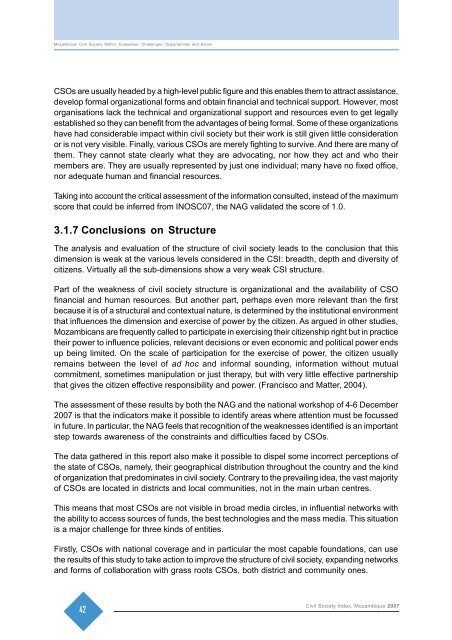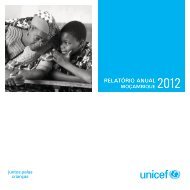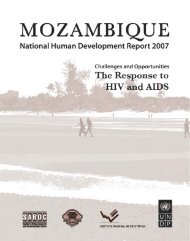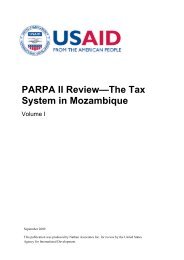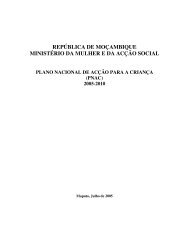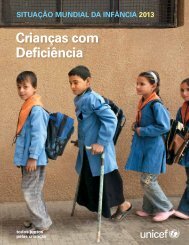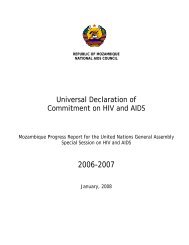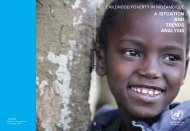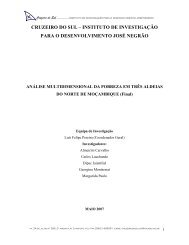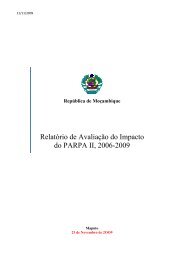Mozambican Civil Society Within: - UNICEF Mozambique - Home page
Mozambican Civil Society Within: - UNICEF Mozambique - Home page
Mozambican Civil Society Within: - UNICEF Mozambique - Home page
Create successful ePaper yourself
Turn your PDF publications into a flip-book with our unique Google optimized e-Paper software.
<strong>Mozambican</strong> <strong>Civil</strong> <strong>Society</strong> <strong>Within</strong>: Evaluation, Challenges, Opportunities and Action<br />
CSOs are usually headed by a high-level public figure and this enables them to attract assistance,<br />
develop formal organizational forms and obtain financial and technical support. However, most<br />
organisations lack the technical and organizational support and resources even to get legally<br />
established so they can benefit from the advantages of being formal. Some of these organizations<br />
have had considerable impact within civil society but their work is still given little consideration<br />
or is not very visible. Finally, various CSOs are merely fighting to survive. And there are many of<br />
them. They cannot state clearly what they are advocating, nor how they act and who their<br />
members are. They are usually represented by just one individual; many have no fixed office,<br />
nor adequate human and financial resources.<br />
Taking into account the critical assessment of the information consulted, instead of the maximum<br />
score that could be inferred from INOSC07, the NAG validated the score of 1.0.<br />
3.1.7 Conclusions on Structure<br />
The analysis and evaluation of the structure of civil society leads to the conclusion that this<br />
dimension is weak at the various levels considered in the CSI: breadth, depth and diversity of<br />
citizens. Virtually all the sub-dimensions show a very weak CSI structure.<br />
Part of the weakness of civil society structure is organizational and the availability of CSO<br />
financial and human resources. But another part, perhaps even more relevant than the first<br />
because it is of a structural and contextual nature, is determined by the institutional environment<br />
that influences the dimension and exercise of power by the citizen. As argued in other studies,<br />
<strong>Mozambican</strong>s are frequently called to participate in exercising their citizenship right but in practice<br />
their power to influence policies, relevant decisions or even economic and political power ends<br />
up being limited. On the scale of participation for the exercise of power, the citizen usually<br />
remains between the level of ad hoc and informal sounding, information without mutual<br />
commitment, sometimes manipulation or just therapy, but with very little effective partnership<br />
that gives the citizen effective responsibility and power. (Francisco and Matter, 2004).<br />
The assessment of these results by both the NAG and the national workshop of 4-6 December<br />
2007 is that the indicators make it possible to identify areas where attention must be focussed<br />
in future. In particular, the NAG feels that recognition of the weaknesses identified is an important<br />
step towards awareness of the constraints and difficulties faced by CSOs.<br />
The data gathered in this report also make it possible to dispel some incorrect perceptions of<br />
the state of CSOs, namely, their geographical distribution throughout the country and the kind<br />
of organization that predominates in civil society. Contrary to the prevailing idea, the vast majority<br />
of CSOs are located in districts and local communities, not in the main urban centres.<br />
This means that most CSOs are not visible in broad media circles, in influential networks with<br />
the ability to access sources of funds, the best technologies and the mass media. This situation<br />
is a major challenge for three kinds of entities.<br />
Firstly, CSOs with national coverage and in particular the most capable foundations, can use<br />
the results of this study to take action to improve the structure of civil society, expanding networks<br />
and forms of collaboration with grass roots CSOs, both district and community ones.<br />
42<br />
<strong>Civil</strong> <strong>Society</strong> Index, <strong>Mozambique</strong> 2007


